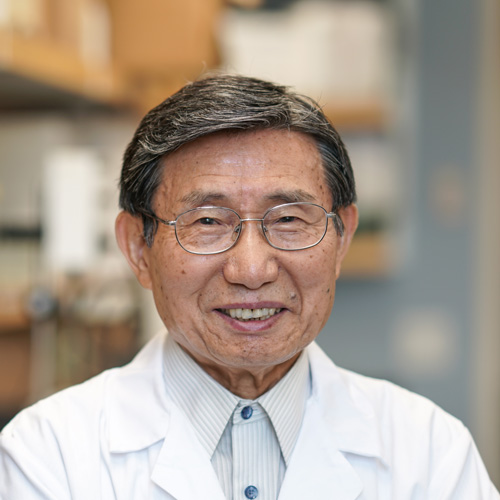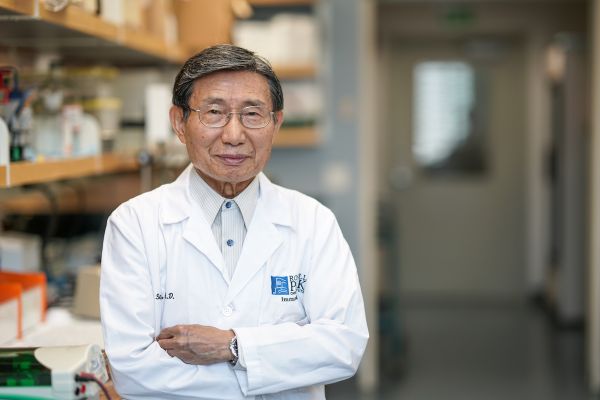Biography
Dr. Ben K. Seon joined the staff of Roswell Park Comprehensive Cancer Center in 1967 as a cancer research scientist. He also serves as a Professor in the Department of Immunology and Microbiology at the University at Buffalo. He received his PhD in Biochemistry (1966) from the Osaka University of Osaka, Japan.
Positions
Roswell Park Comprehensive Cancer Center
- Emeritus Member and Professor of Oncology
- Department of Immunology
Background
Education and Training
- 1966 - PhD - Biochemistry, Osaka University, Osaka, Japan
Professional Memberships
- American Association for Advancement of Science
- American Association for Cancer Research
- American Association of Immunologists
Research Overview
The major objectives of the Seon lab are:
- to discover novel/unique targets of cancer and to develop effective therapeutic agents directed to the discovered targets
- to investigate the mechanisms of action of the developed therapeutic agents
- to develop novel technologies to facilitate translation of the laboratory discoveries to clinical application, and
- to apply the developed therapeutic agents to effectively treat cancer patients
Featured on CancerTalk
Publications
Full Publications list on PubMed
- Seon BK, Toi H, Tsujie T, Tsujie M, Uneda S, Harada N, She X, Takahashi N, Haba A, Matsuno F, Haruta Y, Tsai H. Receptor-targeted anticancer therapy.Immunologic research 2010; 46(1-3):189-191
- Harada N, Takahashi N, Haruta Y, Tsai H, Greco W, Seon BK. Serum endoglin (CD105): Molecular heterogeneity and marked differences among different anti-endoglin monoclonal antibodies in the detection of metastasis and tumor progression. Proceedings of the American Association for Cancer Research Annual Meeting 2010; 51:91
- Seon BK, Tsai H, Toi H, Tsujie T, Uneda S, Harada N, She X, Uneda S, Tsujie M, Takahashi N, Matsuno F, Haba A, Haruta Y. Endoglin-targeted cancer therapy. Current drug delivery 2011; 8(1):135-143
- Mendelson DS, Theuer CP, Seon BK, Alvarez D, Adams BJ, Wong MK, Hurwitz H, Rosen LS, Gordon MS, Leigh BR. Phase I study of TRC105 (anti-CD105 [endoglin] antibody) therapy in patients with advanced refractory cancer. Journal of clinical oncology 2010; 28(15 Suppl.):3013
- Uneda S, Toi H, Tsujie T, Tsujie M, Harada N, Tsai H, Seon BK. Anti-endoglin monoclonal antibodies are effective for suppressing metastasis and the primary tumors by targeting tumor vasculature. International journal of cancer2009; 125(6):1446-1453
- Rosen L, Theuer CP, Seon BK, Alvarez D, Adams BJ, Goldman J, Wong MK, Hurwitz HI, Gordon MS, Leigh BR. A first-in-human Phase 1 study of anti-CD105 antibody therapy with TRC105 in patients with advanced solid tumors.European journal of cancer (Oxford, England : 1990) 2010; 8(7):116
- Tsujie M, Tsujie T, Toi H, Uneda S, Shiozaki K, Tsai H, Seon BK. Anti-tumor activity of an anti-endoglin monoclonal antibody is enhanced in immunocompetent mice. International journal of cancer 2008; 122(10):2266-2273
- Goldman JW, Gordon MS, Hurwitz H, Pili R, Mendelson DS, Adams BJ, Alvarez D, Seon BK, Theuer CP, Leigh BR, Rosen LS. A phase I study of TRC105 (anti-CD105 antibody) in patients with advanced solid tumors : ASCO Meeting Abstracts Part 1. Journal of clinical oncology 2011; 29(15 Suppl.):3073
- Matsuno F, Filadora VA II, Vankouwenberg D, Tsujie M, Tsujie T, Tsai H, Seon BK. Suppression of growth of human malignant B cells by naked monoclonal antibodies that target ectoepitopes of the Ig alpha/Ig ss (CD79) component of the human B cell antigen receptor complex. Proceedings of the American Association for Cancer Research Annual Meeting 2007; 48:972-973
- Toi H, Tsujie M, Harada N, Uneda S, Haba A, Cowan PJ, Tsai H, Senn BK.Validation of endoglin (EDG) as a safe and effective marker for vascular targeting therapy of tumors: Studies of anti-human EDG monoclonal antibody in transgenic mice expressing human EDG, nonhuman primates, and human skin/SCID mouse chimeras bearing established human tumors. Proceedings of the American Association for Cancer Research Annual Meeting 2008; 49:85-86
- Tsujie M, Shiozaki K, Uneda S, Cowan PJ, Clements JL, Tsujie T, Stablewski A, Gross KW, Tsai H, Seon BK. Transgenic BALB/c mice expressing human L-endoglin in vascular endothelium. Proceedings of the American Association for Cancer Research Annual Meeting 2007; 48:329
- Tsujie T, Tsujie M, Haruta Y, Barcos M, Spaulding B, Tsai H, Seon BK.Differential expression of endoglin (CD105) between human malignant epithelial tissues and cultured epithelial cell lines. Proceedings of the American Association for Cancer Research Annual Meeting 2007; 48:907
- Uneda S, Toi H, Harada N, Tsujie M, Tsujie T, Tsai H, Seon BK. Consistent anti-metastatic activities of anti-endoglin monoclonal antibodies in five metastasis models in mice. Proceedings of the American Association for Cancer Research Annual Meeting 2009; 50:38-39
- Toi H, Duzen J, Fujita K, Tsujie M, Tsai H, Seon BK. Novel knock-in mice expressing human/mouse chimeric endoglin (ENG; CD105) develop normally and will be valuable for evaluating clinical application of anti-human ENG antibodies. Proceedings of the American Association for Cancer Research Annual Meeting 2011; 52:Abstract #3278
- Mendelson DS, Rosen LS, Robert F, Chiorean EG, Goldman JW, Seon BK, Alvarez D, Adams BJ, Theuer CP, Leigh BR, Gordon MS. A phase Ib dose-escalation study of TRC105 in combination with bevacizumab for advanced solid tumors. Journal of clinical oncology 2012; 30(15 Suppl.):Abstract #3034
- Spencer SD, Figg WD, Rosen LS, Gordon MS, Hurwitz H, Wong MKK, Goldman JW, Mendelson DS, Adams BJ, Alvarez D, Seon BK, Theuer CP, Leigh BR. Dose-specific clearance of TRC105 (anti-CD105 antibody) in advanced solid tumor patients. Journal of clinical oncology 2012; 30(15 Suppl.):Abstract #3042
- Rosen LS, Hurwitz HI, Wong MK, Goldman J, Mendelson DS, Figg WD, Spencer S, Adams BJ, Alvarez D, Seon BK, Theuer CP, Leigh BR, Gordon MS.A phase I first-in-human study of TRC105 (anti-endoglin antibody) in patients with advanced cancer. Clinical cancer research 2012; 18(17):4820-4829

